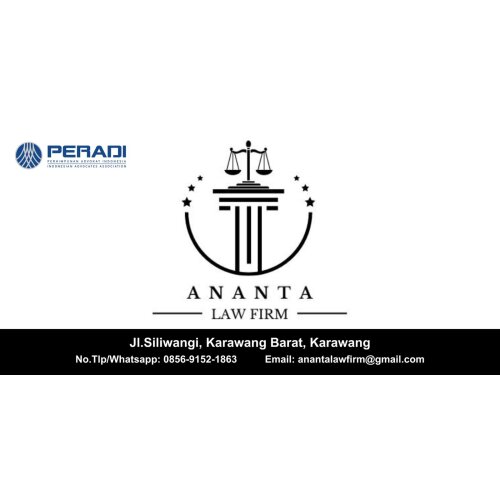Best Nonprofit & Charitable Organizations Lawyers in Karawang
Share your needs with us, get contacted by law firms.
Free. Takes 2 min.
List of the best lawyers in Karawang, Indonesia
About Nonprofit & Charitable Organizations Law in Karawang, Indonesia
Nonprofit and charitable organizations in Karawang, Indonesia play a pivotal role in supporting various social, educational, and humanitarian causes. These organizations operate without the primary goal of generating profit and focus instead on contributing to societal well-being. In Karawang, like in the broader jurisdiction of Indonesia, nonprofit organizations must comply with specific laws and regulations that govern their formation, operation, and dissolution. Understanding these legal frameworks is vital for ensuring the lawful operation of such entities.
Why You May Need a Lawyer
There are several circumstances where individuals or organizations involved with nonprofit and charitable sectors might need legal assistance:
- Establishment and Registration: Navigating the legal requirements to officially register a nonprofit or charitable organization.
- Compliance and Reporting: Ensuring ongoing compliance with local regulations, including tax obligations and reporting requirements.
- Drafting and Reviewing Contracts: Engaging with vendors, donors, or partners and ensuring contracts are legally sound.
- Dispute Resolution: Resolving disputes that may arise internally or with external parties.
- Tax Issues: Understanding tax exemptions and filing requirements specific to nonprofit entities.
- Intellectual Property: Protecting logos, trademarks, and proprietary content developed by the organization.
Local Laws Overview
Key laws governing nonprofit and charitable organizations in Karawang include:
- Yayasan Law: This regulation governs the establishment and operation of foundations in Indonesia, including requirements for management and reporting.
- Perkumpulan Law: Pertains to associations or societies, stipulating guidelines for their registration and governance.
- Taxation Laws: These laws offer guidance on the tax obligations and exemptions available to nonprofit organizations.
- Charity Law: Governs activities related to charitable endeavors, ensuring transparency and accountability in how funds are utilized.
Frequently Asked Questions
What is the process to register a nonprofit organization in Karawang?
The registration process involves defining the mission, drafting a constitution, obtaining approval from the Ministry of Law and Human Rights, and fulfilling specific registration requirements with local authorities.
Are there tax benefits for nonprofit organizations in Indonesia?
Yes, registered nonprofit organizations can avail certain tax exemptions, provided they meet the stipulated criteria and maintain transparent financial records.
Can foreign entities establish nonprofit organizations in Karawang?
Yes, foreign entities can establish nonprofits, but they must comply with both local and national legal requirements, often necessitating partnerships with local organizations.
What are the reporting requirements for nonprofits in Karawang?
Nonprofits must regularly report their financial activities and operational progress to relevant authorities to maintain their registered status.
Do nonprofits need a board of directors?
Yes, nonprofits typically require a board to oversee governance, which is a requirement under the Yayasan Law.
How can a nonprofit protect its intellectual property in Indonesia?
Nonprofits can register trademarks and copyrights with the Directorate General of Intellectual Property to secure their intellectual property rights.
What legal challenges might nonprofits face in Karawang?
Common challenges include compliance with evolving regulations, managing donor relations legally, and handling disputes over governance or finances.
Can a nonprofit engage in commercial activities?
Nonprofits can engage in commercial activities to support their mission, but profits must be used for organizational purposes rather than distribution among members.
Are nonprofit employees subject to labor laws in Indonesia?
Yes, nonprofit employees are entitled to labor protections under Indonesian law, just like employees in other sectors.
How can a nonprofit dissolve legally in Karawang?
Dissolution requires notifying stakeholders, settling debts, and obtaining approval from the Ministry of Law and Human Rights, with remaining assets distributed according to legal guidelines.
Additional Resources
For more information, consider reaching out to local governmental bodies and organizations such as:
- Ministry of Law and Human Rights: Provides guidelines on legal compliance for nonprofits.
- Directorate General of Taxes: Offers guidance on tax obligations and exemptions for nonprofits.
- Karawang Chamber of Commerce: Can provide networking opportunities and additional support for registered organizations.
- Local Bar Association: Access to legal professionals with expertise in nonprofit laws.
Next Steps
If you believe you need legal assistance in the area of Nonprofit & Charitable Organizations, consider taking these steps:
- Consult with a legal professional specialized in nonprofit law to understand your specific obligations and rights.
- Engage with local nonprofit networks or support organizations that can provide insights and advice.
- Educate yourself on the legal landscape by attending workshops or seminars focused on nonprofit governance and law.
- Prepare necessary documentation and ensure ongoing compliance with local laws to avoid legal challenges.
Lawzana helps you find the best lawyers and law firms in Karawang through a curated and pre-screened list of qualified legal professionals. Our platform offers rankings and detailed profiles of attorneys and law firms, allowing you to compare based on practice areas, including Nonprofit & Charitable Organizations, experience, and client feedback.
Each profile includes a description of the firm's areas of practice, client reviews, team members and partners, year of establishment, spoken languages, office locations, contact information, social media presence, and any published articles or resources. Most firms on our platform speak English and are experienced in both local and international legal matters.
Get a quote from top-rated law firms in Karawang, Indonesia — quickly, securely, and without unnecessary hassle.
Disclaimer:
The information provided on this page is for general informational purposes only and does not constitute legal advice. While we strive to ensure the accuracy and relevance of the content, legal information may change over time, and interpretations of the law can vary. You should always consult with a qualified legal professional for advice specific to your situation.
We disclaim all liability for actions taken or not taken based on the content of this page. If you believe any information is incorrect or outdated, please contact us, and we will review and update it where appropriate.








